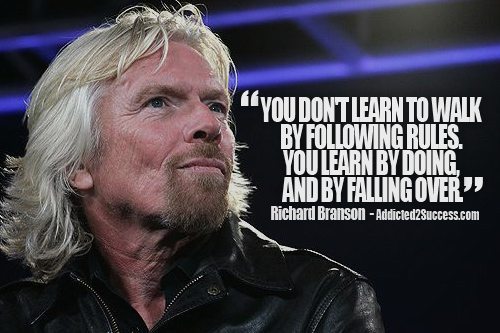Entrepreneurs
Why Richard Branson Is So Successful

Sir Richard Branson is a businessman investor from the UK. He is the founder of the Virgin Group which is made up of more than four hundred companies.
Branson famously left school at sixteen and began his entrepreneurial journey immediately when he started a magazine and quickly branched out into the record business..
Branson now heads a globally recognised brand, fuels global humanitarian efforts and is famous for his adventurous spirit.
The Early Days
 After being challenged for many years by his dyslexia, Richard Branson decided to leave school at sixteen to start a youth culture magazine called Student. The idea was it was to be a magazine run by students for students and Branson sold the first fifty thousand copies for free after covering costs by selling over $8,000 worth of advertising.
After being challenged for many years by his dyslexia, Richard Branson decided to leave school at sixteen to start a youth culture magazine called Student. The idea was it was to be a magazine run by students for students and Branson sold the first fifty thousand copies for free after covering costs by selling over $8,000 worth of advertising.
At the age of nineteen, Branson was living in a London commune and was in close contact with the music and drug scene. It was whilst in this environment that he had the idea of starting a mail-order record company called Virgin to help fund his magazine. The company did well enough for Branson to expand his business by adding a record shop in the famous Oxford Street, London. After the record company began to do well, the boy who dropped out of school was able to build his first recording studio.
Virgin Records
Branson and Virgin Record’s first recording was the smash hit ‘Tubular Bells’ by Mike Oldfield. The song stayed in the UK charts for two hundred and forty seven weeks. Eager to rapidly build on the success, Branson signed other up and coming groups to his label, including the Sex Pistols. Virgin Records then grew to one of the biggest record companies in the world as Branson proceeded to sign Genesis, Culture Club and The Rolling Stones.
“Do not be embarrassed by your failures, learn from them and start again.” – Richard Branson
The Growth of an Empire
 Branson continued to increase his entrepreneurial efforts, including the travel company Voyager Group in 1980 and the birth of the airline Virgin Atlantic in 1984, as well as a series of Virgin Megastores. However, his journey was not without some adversity and in 1992 Virgin found itself struggling to function financially and Virgin Records was sold that same year to EMI for $1 Billion. Branson was deeply hurt by having to sell the record business where it all started and he apparently cried when the sale was finalized. He was adamant that he was going to stay in the music business and he founded Virgin Radio in 1993 and started a second record company, V2 in 1996.
Branson continued to increase his entrepreneurial efforts, including the travel company Voyager Group in 1980 and the birth of the airline Virgin Atlantic in 1984, as well as a series of Virgin Megastores. However, his journey was not without some adversity and in 1992 Virgin found itself struggling to function financially and Virgin Records was sold that same year to EMI for $1 Billion. Branson was deeply hurt by having to sell the record business where it all started and he apparently cried when the sale was finalized. He was adamant that he was going to stay in the music business and he founded Virgin Radio in 1993 and started a second record company, V2 in 1996.
Branson’s Virgin Group has grown to hold more than 400 companies across the globe with business activity in the UK, the USA, Australia, Canada, Asia, South Africa and mainland Europe. The Virgin Group and Branson have expanded into trains, mobile phones, TV, drinks, banks and more.
Richard Branson’s estimated net worth is $4.7 Billion.
Virgin Galactic

Recently, the ambitious and adventurous Richard Branson has dedicated a large portion of his time and energy to his space tourism project. In the autumn of 2000, Branson announced that Virgin Galactic will license the technology behind Spaceship One funded by the co-founder of Microsoft, Paul Allen and designed by the renowned aeronautical engineer from the USA, Burt Rutan. The vision is to take paying passengers into space at a cost of $200,000. By 2014 over five hundred people had purchased tickets to go on one of Virgin Galactic’s Voyages.
Humanitarian Efforts
 Towards the end of the 1990’s, Branson and musician Peter Gabriel met with Nelson Mandela to discuss their idea of a group of leaders with no personal agenda, working together to tackle global conflicts. In the summer of 2007, Mandela announced the formation of an independently funded group of donors ‘The Elders’ who were to use their skills to find peaceful resolutions to conflicts. They would also create new approaches to global challenges that were causing or may cause human suffering. In 1999, Branson became the founding sponsor of the International Centre for Missing & Exploited Children. The organizations goal is to locate missing children and put an end to the exploitation of young people.
Towards the end of the 1990’s, Branson and musician Peter Gabriel met with Nelson Mandela to discuss their idea of a group of leaders with no personal agenda, working together to tackle global conflicts. In the summer of 2007, Mandela announced the formation of an independently funded group of donors ‘The Elders’ who were to use their skills to find peaceful resolutions to conflicts. They would also create new approaches to global challenges that were causing or may cause human suffering. In 1999, Branson became the founding sponsor of the International Centre for Missing & Exploited Children. The organizations goal is to locate missing children and put an end to the exploitation of young people.
“My philosophy is that if I have any money I invest it in new ventures and not have it sitting around.” – Richard Branson
 In 2008 Branson was the host of a gathering designed to discuss global warming related problems that face the world with the view of it being the first of many meetings. Branson held the meeting on his private island in the British Virgin Islands and British Prime Minister Tony Blair, Wikipedia founder Jimmy Wales and Google’s Larry Page were all present.
In 2008 Branson was the host of a gathering designed to discuss global warming related problems that face the world with the view of it being the first of many meetings. Branson held the meeting on his private island in the British Virgin Islands and British Prime Minister Tony Blair, Wikipedia founder Jimmy Wales and Google’s Larry Page were all present.
Late 2013, Branson urged businesses to boycott Uganda because of the bill it had passed against homosexuality. Branson stated that it would be against his conscience to support the country and that governments had to realize that people should be free to love who they want.
Conclusion
Richard Branson has made himself a billionaire whilst enriching the lives of other through business and humanitarian work. His ability to take things that already exist and do them better is incredible as well his ability to keep creating business ideas whilst not being deterred by ‘failures’.
As people that are looking to be successful in life we can truly learn from Richard Branson’s philosophy of embracing ‘failures’ and learning from them to ultimately achieve great things.
Richard Branson Picture Quote
Entrepreneurs
Most Entrepreneurs Fail to Do This and It’s Killing Their Success
Celebrating progress also provides entrepreneurs with the psychological sustenance needed to endure the marathon of building a business

The journey from a mere concept to a tangible reality is one of the most exhilarating yet challenging paths an entrepreneur can navigate. This odyssey is punctuated by milestones that stand as testaments to perseverance, innovation, and relentless hard work. (more…)
Entrepreneurs
9 Ways Augmented Reality Gives Your Business a Competitive Edge
By embracing AR technology, companies can unlock new opportunities for growth, innovation, and success

Leveraging Augmented Reality for Business Advancement: Exploring Applications
In the ever-evolving landscape of business innovation, Augmented Reality in business emerges as a transformative force, reshaping traditional paradigms and unlocking new opportunities for growth and advancement.
Through a comprehensive examination of AR’s capabilities, applications, and business benefits, this article serves as a roadmap for enterprises seeking to harness the full potential of augmented reality to propel their success in the digital age.
UNI.Agency as a forefront developmental agency tailors unmatched digital products and immersive experiences. They help companies outperform their competitors and customers’ expectations. And now, there is time to delve deep into the AR realm.
Gaining Insight into Augmented Reality
From revolutionizing customer experiences to optimizing operational efficiency, AR in retail is poised to drive significant advancements in how businesses operate and engage with their stakeholders.
Augmented Reality (AR) seamlessly integrates digital information and virtual objects into the real-world environment, offering users an immersive and interactive experience through devices like smartphones or AR glasses.
It revolutionizes various industries, from entertainment to healthcare, by enhancing perception and creating innovative opportunities for engagement and exploration in the digital era. AR not only enriches our understanding of reality but also opens up new possibilities for creativity, communication, and problem-solving, making it a powerful tool for businesses seeking to enhance customer experiences and streamline operations in an increasingly digital world.
Differentiating Augmented Reality and Virtual Reality
Augmented Reality (AR) overlays digital elements onto the real world, enhancing the user’s perception of their environment. Virtual Reality (VR), however, immerses users in entirely virtual environments, blocking out the real world. There are some core differences between these two technologies in gear and display approaches:
- AR enriches reality with digital information, while VR creates entirely immersive virtual experiences.
- AR typically requires less specialized hardware, like smartphones or AR glasses, while VR often involves dedicated headsets.
- AR is commonly used for enhancing real-world experiences, such as in gaming, retail, and navigation, encouraging augmented reality shopping. Whereas VR is primarily employed for immersive simulations, training, and entertainment in fully virtual environments.
The Influence of AR on the Customer Experience Journey
As of 2024, Augmented Reality (AR) has evolved into an indispensable tool across various sectors, offering immersive and interactive experiences that seamlessly blend digital elements with the real world.
Stimulating Interest
Augmented Reality (AR) captivates customers by offering visually engaging experiences that spark curiosity and intrigue, enticing them to explore products or services further.
AR’s ability to overlay digital content onto the real world creates an immersive and attention-grabbing experience, drawing customers in and igniting their interest.
Educating and Empowering Users
AR in business empowers users by providing interactive and informative experiences that educate them about products, services, or concepts in a visually compelling manner.
Through AR, customers can interact with virtual models, animations, or informational overlays, gaining a deeper understanding of the features, benefits, or use cases of the offerings.
Exploring Further Depths
AR encourages customers to delve deeper into products or services by offering immersive and interactive experiences that go beyond traditional marketing materials.
By allowing users to explore virtual representations of products in real-world contexts, AR in retail provides a unique opportunity for customers to visualize how offerings fit into their lives, fostering deeper engagement and understanding.
Business Benefits of Augmented Reality
Businesses utilize AR for diverse applications, including product visualization, virtual try-ons, and enhanced customer engagement. In education, AR transforms learning experiences by providing interactive simulations and visualizations.
Additionally, AR has become integral to industries such as healthcare, where it facilitates surgical training and patient education. With advancements in AR technology and widespread adoption, it continues to shape how we perceive and interact with our environment, ushering in a new era of innovation and connectivity.
Let’s look at why AR has become so indispensable as a business tool nowadays.
Revolutionizing Training Methods
AR in business transforms training by offering immersive, interactive simulations that replicate real-world scenarios, enhancing employee learning and skill development.
It’s lucrative for hands-on training experiences. Since there’s no need for physical equipment or environments, reducing costs and logistical constraints while improving knowledge retention and performance.
Boosting Productivity Levels
Augmented Reality in business boosts productivity by providing real-time access to information and guidance, allowing employees to complete tasks more efficiently and accurately.
Through AR-powered tools and applications, workers can streamline workflows, troubleshoot issues, and collaborate effectively, resulting in increased output and operational efficiency.
Implementing Dynamic Marketing Approaches
AR enables businesses to implement dynamic marketing strategies that captivate and engage audiences in unique ways.
By integrating AR into marketing campaigns, companies can create interactive experiences that drive brand awareness, customer engagement, and sales conversions, setting themselves apart in a crowded marketplace.
Fostering Product Development
Augmented reality and marketing foster innovation in product development by facilitating virtual prototyping, design iterations, and collaborative decision-making.
With AR, teams can visualize and test product concepts in 3D, gather feedback from stakeholders, and make informed design decisions faster, leading to faster time-to-market and more successful product launches.
Creating Tailored Customer Experiences
AR creates personalized customer experiences by allowing users to interact with products and services in customized ways.
Through AR-enhanced applications and experiences, businesses can tailor content, recommendations, and promotions to individual preferences and behaviors, enhancing customer satisfaction and loyalty.
Amplifying Brand Recognition
Augmented Reality shopping amplifies brand recognition by providing memorable and shareable experiences that leave a lasting impression on customers.
By incorporating AR into branding initiatives, companies can create immersive brand experiences that spark conversations, increase social media engagement, and strengthen brand loyalty, ultimately driving business growth and success.
Final Thoughts
In conclusion, Augmented Reality in business stands as a transformative force, offering a multitude of benefits across various aspects of operations. From revolutionizing training methods to boosting productivity levels, AR empowers businesses to thrive in an increasingly competitive environment.
By embracing AR technology, companies can unlock new opportunities for growth, innovation, and success, while delivering immersive and engaging experiences that resonate with customers and stakeholders alike.
As AR continues to evolve and integrate into everyday business practices, Uni will incorporate the best practices to promote business advancement and drive meaningful change for the clients. We’re to shape the future of commerce to your benefit.
Entrepreneurs
How Entrepreneurs Are Harnessing LLCs to Launch Successful Startups
LLCs have unique advantages for starting up and growing a successful business

In my entrepreneurial journey, I’ve learned that LLCs have unique advantages for starting up and growing a successful business. But, before delving into the advantages, it’s essential to grasp the fundamentals of what an LLC is and how it operates.
What is an LLC?
An LLC is a hybrid business entity that combines the liability protection of a corporation with the pass-through taxation of a partnership or sole proprietorship. This unique blend provides entrepreneurs with the best of both worlds: personal asset protection and simplified taxation.
One of the most significant advantages of an LLC is its limited liability feature. This means that as the owner, my personal assets are shielded from any liabilities or debts incurred by the business.
In the event of lawsuits or financial obligations, only the assets of the LLC are at risk, offering me peace of mind and protecting my personal wealth.
Advantages of Forming an LLC
Flexibility in Management and Structure
Another aspect of the LLC that appealed to me was its flexibility in management and structure. Unlike corporations, which have rigid hierarchies and formalities, LLCs allow for a more relaxed approach to governance. As the founder, I have the freedom to structure the company in a way that suits the needs and goals of my startup.
For instance, LLCs can choose to be managed by their members (owners) or appoint a manager to oversee operations. This flexibility enables me to maintain full control of the business or delegate management responsibilities to trusted individuals while retaining ownership.
Additionally, LLCs are not bound by strict meeting requirements or extensive record-keeping obligations, reducing administrative burdens and allowing me to focus on building and growing the business.
Pass-Through Taxation and Financial Efficiency
One of the most attractive features of an LLC, particularly for startups, is its pass-through taxation. Unlike corporations, which are subject to double taxation (taxation at both the corporate and individual levels), LLCs pass profits and losses directly to their members’ personal tax returns.
This tax efficiency not only simplifies the filing process but also allows for greater flexibility in managing cash flow and reinvesting profits back into the business. As an entrepreneur, minimizing tax liabilities and maximizing financial efficiency are critical components of long-term success, and the pass-through taxation feature of an LLC aligns perfectly with these objectives.
Enhanced Credibility and Professionalism
Establishing an LLC can also enhance the credibility and professionalism of a startup. Unlike sole proprietorships or general partnerships, which may be perceived as informal or less legitimate, an LLC provides a formal business structure that instills confidence in customers, investors, and partners.
By operating under the umbrella of an LLC, I can present my startup as a reputable and established entity, which can open doors to opportunities such as securing financing, attracting top talent, and forging strategic partnerships.
This enhanced credibility can be a significant advantage, particularly in competitive industries or when seeking to differentiate my startup in the market.
Protection of Intellectual Property and Brand Assets
For startups built around innovative ideas or unique intellectual property, protecting these assets is paramount. An LLC offers an additional layer of protection for intellectual property and brand assets, safeguarding them from infringement or unauthorized use.
By registering trademarks, copyrights, or patents under the name of the LLC, I can establish legal ownership and enforce my rights more effectively in the event of disputes or infringement claims. This protection not only preserves the value of my intellectual property but also enhances the overall stability and longevity of the startup.
Steps to Form an LLC
Let us now look at the general steps to form an LLC for your business:
Step 1: Choose a Name for Your LLC
Selecting a unique and distinguishable name is the first step in forming an LLC. Ensure that the name you choose complies with the rules set by your state’s LLC division. Typically, the name must end with “Limited Liability Company,” “LLC,” or an abbreviation of these terms.
Additionally, the name should not infringe on the trademarks of existing businesses.
Step 2: Designate a Registered Agent
A registered agent is an individual or entity appointed to receive legal documents, such as lawsuits or subpoenas, on behalf of the LLC. The registered agent must have a physical address within the state where the LLC is formed.
For instance, if you are forming an LLC in Texas, ensure that your registered agent has a physical address in Texas.
This role is crucial for ensuring that the LLC remains compliant with legal requirements and maintains good standing.
Step 3: File Articles of Organization
The Articles of Organization, also known as a Certificate of Formation or Certificate of Organization in some states, is a document that formally establishes the LLC. You’ll need to submit this document to the appropriate state agency, usually the Secretary of State or Division of Corporations.
The articles typically include basic information such as the LLC’s name, address, registered agent details, and the purpose of the business.
Step 4: Create an Operating Agreement
While not always a legal requirement, drafting an operating agreement is highly recommended for LLCs. This document outlines the ownership structure, management roles, voting rights, profit-sharing arrangements, and other important aspects of the LLC’s operations.
Even if you’re the sole owner of the LLC, having an operating agreement in place can help clarify expectations and prevent disputes in the future.
Step 5: Obtain an Employer Identification Number (EIN)
An Employer Identification Number (EIN), also known as a Federal Tax Identification Number, is a unique nine-digit number assigned by the Internal Revenue Service (IRS) to identify your LLC for tax purposes.
Even if your LLC doesn’t have employees, obtaining an EIN is necessary for opening a business bank account, filing taxes, and conducting other financial transactions.
Step 6: Obtain Necessary Permits and Licenses
Depending on the nature of your business and its location, you may need to obtain various permits, licenses, or certifications to operate legally. These requirements can vary widely from one industry and jurisdiction to another. Common examples include business licenses, zoning permits, health permits, and professional licenses.
In my entrepreneurial journey, the decision to establish my startups as LLCs has been instrumental in mitigating risks, optimizing financial performance, and positioning my ventures for long-term success.
By harnessing the advantages of the LLC structure, I’ve been able to navigate the complexities of entrepreneurship with confidence and resilience, laying the groundwork for a bright and prosperous future.
Entrepreneurs
Build a Strong IT Team with These Smart Hiring Tips
Without dedicated IT staff, your company may not be able to function as efficiently or effectively

The role of IT staff in your company is not only essential but also ever-evolving. As your business grows, so does the need for qualified IT staff and more robust recruiting solutions.
After all, from maintaining and troubleshooting the computer systems that keep your business running smoothly, IT staff also help employees stay connected and productive by providing technical support at all times. (more…)
-

 Success Advice4 weeks ago
Success Advice4 weeks ago10 Landing Page Hacks Experts Are Using to Generate Leads
-

 Entrepreneurs3 weeks ago
Entrepreneurs3 weeks agoThe Mindset Shifts Required to Become a Successful Online Entrepreneur
-

 Success Advice2 weeks ago
Success Advice2 weeks agoHow to Choose the Best Affiliate Programs for Your Blog
-

 Success Advice3 weeks ago
Success Advice3 weeks agoThe Power of Ethical Leadership: How Integrity Drives Success
-

 Entrepreneurs3 weeks ago
Entrepreneurs3 weeks ago6 Hacks to Boost Your Productivity as a Business Owner
-

 Entrepreneurs2 weeks ago
Entrepreneurs2 weeks ago5 Important Legal Tips Every Entrepreneur Should Know
-

 Entrepreneurs2 weeks ago
Entrepreneurs2 weeks agoBuild a Strong IT Team with These Smart Hiring Tips
-

 Startups2 weeks ago
Startups2 weeks agoHow to Manage Your Startup’s Finances More Efficiently
































9 Comments